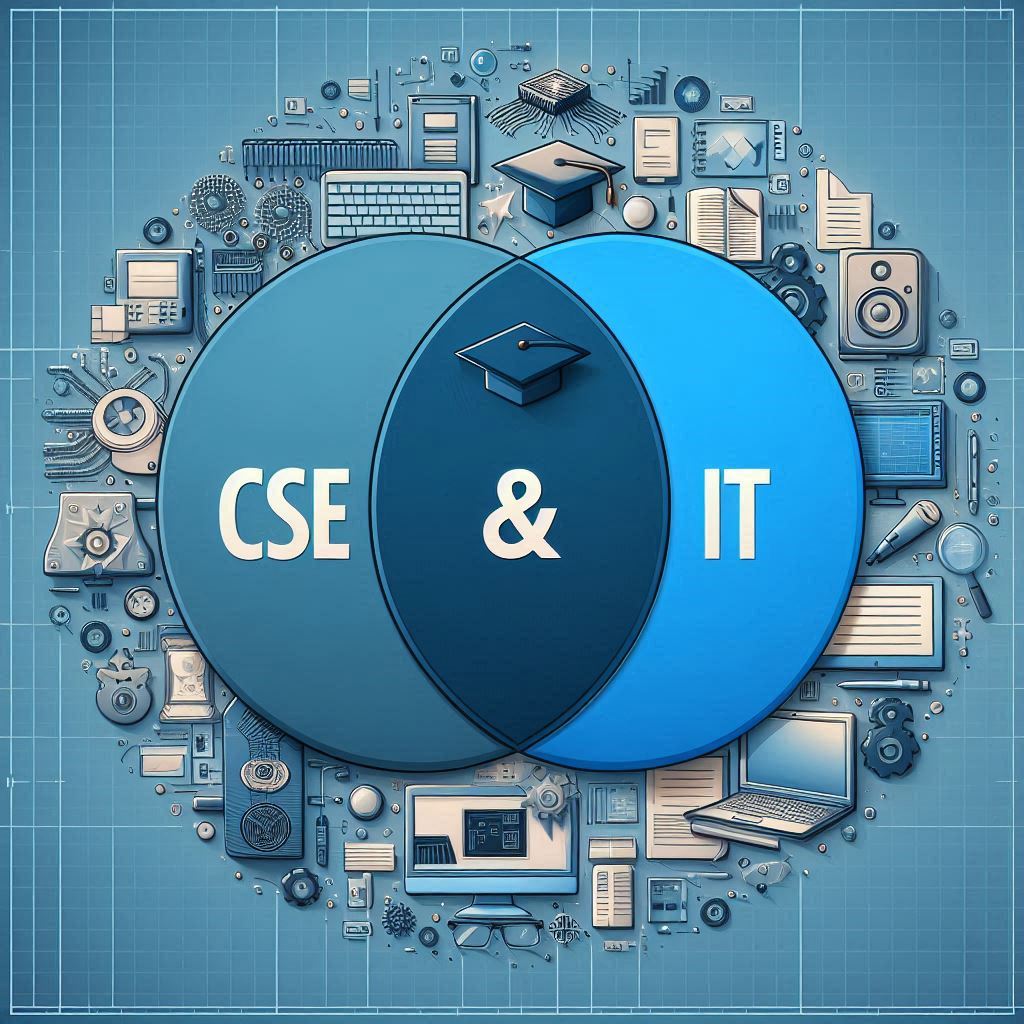Discover the key Difference Between BTech in CSE and IT. Understand the distinct career paths, curriculum focus, and job opportunities to make an informed decision. Learn more about BTech in Computer Science Engineering vs Information Technology.
Table of Contents
Understanding the differences between Computer Science Engineering (CSE) and Information Technology (IT) is crucial for students deciding on their B.Tech specializations. Both fields are integral to the technology sector, yet they have distinct focuses, curricula, and career paths.

Difference Between BTech in CSE and IT
Understanding The Curriculum and Focus In CSE And IT
Computer Science Engineering (CSE) is a comprehensive field that encompasses the theoretical foundations of computing along with practical techniques for designing software and hardware systems. The curriculum includes subjects like data structures, algorithms, computer networks, operating systems, database management, artificial intelligence, machine learning, and computer architecture. It often delves deeper into the principles of computing and mathematical foundations.
Information Technology (IT), on the other hand, is more application-oriented. The IT curriculum focuses on the practical aspects of computing and how to apply computing technology to solve real-world problems. Key subjects include software engineering, web development, cybersecurity, cloud computing, information systems management, and IT infrastructure. While it shares some common ground with CSE, IT places more emphasis on the deployment, management, and security of information systems in business and organizational contexts.
Skill Set Development in CSE And IT
CSE students develop strong programming skills, algorithmic thinking, and a deep understanding of computer systems. They learn multiple programming languages, software development methodologies, and advanced topics like machine learning, artificial intelligence, and data science. This broad and deep skill set prepares them for a variety of technical roles, including software development, systems engineering, and research.
IT students gain expertise in managing and maintaining IT infrastructure, ensuring system security, and implementing technology solutions for businesses. They learn to work with databases, manage networks, develop web applications, and understand the intricacies of cybersecurity. This prepares them for roles such as IT consultants, system administrators, network engineers, and cybersecurity analysts.
Career Opportunities and Placement Offers In CSE And IT
Below is a table of the placement offers (in Lakhs Per Annum, LPA) for B.Tech graduates in Computer Science Engineering (CSE) and Information Technology (IT) in India.
| Specialization | Highest Placement Offer (LPA) | Lowest Placement Offer (LPA) | Average Placement Offer (LPA) |
|---|---|---|---|
| CSE | 80 | 3 | 10 |
| IT | 50 | 3 | 8 |
- Highest Placement Offer (LPA): This represents the topmost salary package offered to students during campus placements. For CSE, this can reach up to 80 LPA, often from top tech giants or startups. For IT, it can go up to 50 LPA, usually in specialized roles in companies focusing on IT solutions and services.
- Lowest Placement Offer (LPA): This is the minimum salary package offered, which tends to be around 3 LPA for both CSE and IT graduates. This figure represents entry-level positions in smaller companies or startups.
- Average Placement Offer (LPA): The average salary package gives an idea of the typical offer students can expect. CSE graduates often see an average of around 10 LPA, reflecting the demand for their deep technical expertise. IT graduates see an average of around 8 LPA, indicating steady demand for IT professionals with practical skills in managing and implementing technology solutions.
The career opportunities for CSE graduates are diverse and often overlap with those for IT graduates. However, CSE graduates typically find roles in software development, data science, artificial intelligence, machine learning, and research and development. Companies like Google, Microsoft, Amazon, and Facebook actively seek CSE graduates for their technical prowess and problem-solving abilities. The placement packages for CSE graduates can be quite lucrative, especially if they secure positions in top tech firms or startups working on cutting-edge technologies.
IT graduates are highly sought after in sectors where the application of technology to solve business problems is key. They often find roles in IT consulting firms, financial services, healthcare, and any industry that relies heavily on IT infrastructure. Companies like Accenture, IBM, TCS, Infosys, and Wipro regularly hire IT graduates for roles in systems management, IT consulting, and cybersecurity. While the placement packages for IT graduates can vary, those with strong skills in emerging technologies like cloud computing and cybersecurity can command competitive salaries.
Industry Demand and Future Trends In CSE and IT
Both CSE and IT are fields with strong industry demand, but the nature of the demand can differ. The tech industry continues to grow, driven by advancements in artificial intelligence, machine learning, big data, and cloud computing. CSE graduates are well-positioned to take advantage of these trends, especially in roles that require deep technical knowledge and innovation.
The demand for IT professionals is also robust, especially in areas like cybersecurity, cloud services, and IT infrastructure management. As more businesses undergo digital transformation, the need for IT expertise to manage and secure these systems is increasing. IT graduates with skills in cybersecurity, cloud computing, and IT management will find ample opportunities in the job market.
Conclusion
In summary, while both Computer Science Engineering and Information Technology are crucial to the technology sector, they cater to different aspects of computing and technology application. CSE focuses more on the theoretical and technical foundations of computing, preparing students for a wide range of technical roles. IT, with its application-oriented approach, equips students with the skills needed to manage and implement technology solutions in various business environments. Understanding these differences can help students make informed decisions about their B.Tech specialization based on their interests, strengths, and career aspirations.

